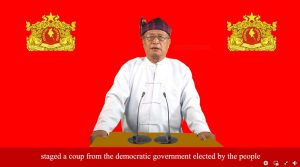Myanmar’s opposition National Unity Government (NUG) has declared a “people’s defensive war” against the ruling military junta led by Sen. Gen. Min Aung Hlaing, which seized power in a coup in February. Duwa Lashi La, the ethnic Kachin politician who currently serves as the acting president of the NUG, announced the news in a video posted on Facebook today, declaring all of Myanmar to be under a state of emergency “until the resumption of civilian rule.”
“With the responsibility to protect the life and properties of the people, the National Unity Government… launched a people’s defensive war against the military junta,” he said in the address. “As this is a public revolution, all the citizens within the whole of Myanmar, revolt against the rule of the military terrorists led by Min Aung Hlaing in every corner of the country.”
Duwa Lashi La urged police and soldiers to abandon the junta and flock to the banner of the People’s Defense Force (PDF), the NUG’s military arm. “All the civil servants under the military council, we warn and forbid you from going to the office from today onward,” he added. “The power of the people is much stronger than the people in power.”
In his video message, Duwa Lashi La called on Myanmar’s raft of ethnic groups to “immediately attack” the military, while ordering the PDF militias to “target to control the military junta and its assets” in their respective areas. He also called on the public to refrain from all non-essential travel and stock up on basic necessities and foodstuffs, promising that the PDF would protect their lives and property.
Myanmar has seen sporadic armed resistance for months, as dozens of civilian militias have taken up arms, some in the name of the PDF, in response to the junta’s violent crackdowns on protesters. This has been paralleled by intensified fighting between the Myanmar military and ethnic armed organizations including the Kachin Independence Organization (KIO) and the Karen National Union (KNU).
The call for a nationwide uprising appears to mark the beginning of the “D-Day” that has been mentioned for weeks in anti-coup circles as the signal for an all-out struggle against the junta, with the ultimate aim of extricating it from Myanmar politics for good.
The reaction to the announcement was immediate. According to the Democratic Voice of Burma, “Within minutes of the NUG announcing a ‘D-Day,’ supermarkets and pharmacies across Burma have filled with panic buyers.” There were also reports of an outbreak of fighting today between the Tatmadaw and the Karen National Union in Tanintharyi Region, and the deployment of fighter jets from air force bases in Meiktila and Magwe.
The NUG’s stakes-raising move comes a few days after Erywan Yusof, the special envoy appointed by the Association of Southeast Asian Nations (ASEAN), called for a four-month ceasefire to allow the delivery of vital humanitarian and COVID-19 aid. But in his video address today, Duwa Lashi La’s said that he believed that ” neighboring countries, ASEAN countries, United Nations and all the other countries around the world understand, that we do [this] out of necessity based on the country’s current situation.”
The uprising is seemingly timed to the upcoming session of the U.N. General Assembly in New York, when the Assembly’s Credentials Committee is set to consider who should occupy Myanmar’s seat to the global body. Myanmar’s current U.N. ambassador Kyaw Moe Tun has pledged loyalty to the NUG and the ousted National League for Democracy government.
Given the wide disparity of forces between the Tatmadaw and its myriad opponents, the path to victory for the NUG would most likely involve encouraging mass defections from the security forces on such a scale that the military administration collapses under its own top-heavy weight. According to a report last week from Radio Free Asia, nearly 2,500 soldiers and police have broken with the military junta to join the resistance movement since the coup.
With its implications of a one-time all-out push for victory, the “D-Day” metaphor suggests a formalization of the state of de facto civil war that has prevailed since the coup, and in many parts of the country for many years before that. The likely result is a sharp intensification of fighting in the weeks and months to come, with uncertain results.
While the PDFs and their ethnic allies are unlikely to be able to defeat the Tatmadaw in a direct fight, and the prospect of mass defections from the security forces remains uncertain, they can go a long way to making the country ungovernable, as they have already done in various parts of the country.

































